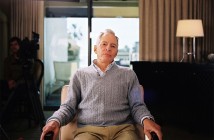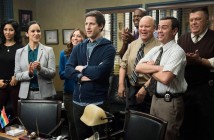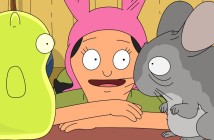September 30, 2014, 8:00 p.m. (EST), ABC
“Being friended is not the same thing as having friends.”
That could easily serve as the de-facto slogan for Selfie, a Pygmalion remix that is so focused on making its heroine a vacuous, unbearable excuse for a human being that it forgets to actually make her worth watching in this first episode. A pilot thing is a difficult thing to pull off, involving as it does the introduction of characters, a plot, and an ongoing story viewers can get invested in. Comedy pilots are even harder, because on top of all of that, they also have to be funny. Selfie isn’t particularly funny in this first outing, nor does it do a great job of making its two leads particularly worth investing in. But it has the best thing a sitcom pilot can hope for: a great cast.
The show stars Karen Gillan and John Cho, two incredibly charming, innately likable performers who may be slightly adrift with the less than stellar material they are handed here, but who are more than capable of anchoring a show on their own. It is clear that Selfie will be a romantic comedy from the start, and Eliza (Gillan) will fall in love with Henry (Cho) over the course of its run. Based on their characterizations in this pilot, that’s a fairly grim prospect. But based on the actors involved, that is something I could easily see myself becoming invested in. This show needs to figure out how to write itself, and it needs to figure out how to be funny more consistently, but it has two people I like enough to watch while those other elements come together.
The show’s premise demands that Eliza be a horrible person who decides she needs to be better, an incredibly common starting point for sitcoms, and also, an especially odd one considering the general format of this genre. Many shows begin with an “unlikable” protagonist who ends the pilot committing to improve, only to discover that is an incredibly difficult premise to maintain. Either the character begins each episode going forward by being awful and ends it learning how to be good (which becomes repetitive and unbelievable pretty quickly), or they improve incredibly quickly and the show loses its premise in favor of becoming something else entirely. It is impossible to tell what sort of show Selfie is this early on, but based on other shows of its ilk over the years, I am willing to put money on it being the former for about half a season before it learns it has to be the latter. This means that, should the show survive for a full season, or into a second, it might become something incredibly interesting. Either way, if it stays on the air, it is likely to be something very different than it is in this pilot.
There is, of course, another problem with the show’s Pygmalion premise and the ways it has chosen to update it: this pilot ends up involving a man telling a woman all of the various ways she is an insult to society as he likes to see it (ways which, by the way, include “loose sexual morals,” a thing about which the less said, the better). This is probably not the tone the episode was going for, but it ends up making more assumptions about Eliza than judging her for actual facts about her, and it very rarely chooses to color those assumptions in, either to prove or disprove them. It isn’t really fair to ask a 22 minute episode of television to create a fully-formed character, but Eliza isn’t just not well-rounded; she’s completely two dimensional. In its pilot, Selfie feels like a show about a man telling a woman who mostly conforms to a vapid society’s vision for what a woman might be like that being what thousands of people on the internet tell her to be and praise her for being actually makes her a horrible human being. This may or may not be true, but it is certainly missing a lot of the point.
The Selfie I would watch arrives late in the episode, as the show starts to pierce Henry’s perfection and become what it will quickly need to be: a show about two awkward, broken people trying to become better for themselves and for each other. The humor here comes from broad generalizations of the sort that only work if you forget the butt of the joke is a human being, and that’s not the sort of thing I can really imagine myself being interested in over the long term. There’s a nub of brilliance in the show’s idea, even if in “Pilot” it feels like just another piece of entertainment desperate to point out that the internet is slowly killing our social skills, but inept at actually making that point hit home in any way that resembles real life. Selfie has enough in its basic DNA that it could become a show worth watching. But “Pilot” is a misstep out of the gate, an episode that squanders the potential of this cast and this premise. Here’s hoping the show figures out how to use both going forward. Selfie itself could use a rebranding.
The Roundup
- “Look, I know its intimidating to fall for a girl with a strong pelvic floor and an advertising presence on her Facebook page…”
- “Ok, first of all, I had no idea he was married when we engaged in gland-to-gland combat, and second of all, I get super horny when I travel, and that’s not my fault. That’s science.”
- “You know, I read an article that said Asian men are more comfortable kissing on the mouth as a sign of friendship.” “They’re not.” “Alright. I’ll forward it to you.”
- “Come on, I just want to change my image.” “Do you mean…be a better person?” “Or that.”
- “Why would she be bagel?” “Its unclear.”
Selfie has enough in its basic DNA that it could become a show worth watching.
-
OKAY




